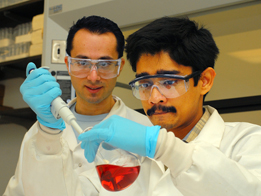Home > Press > UCF Technique Promises to Aid Doctors' Ability to Identify, Treat Bacterial Infections
 |
| Photo: Jacque Brund.
Nanoscience Technology Center post-doctoral fellow Sudip Nath and graduate student Charalambos Kaittanis are co-authors of the study published in Analytical Chemistry. |
Abstract:
A new technique developed by a University of Central Florida chemist will help physicians more quickly identify the bacterial infections patients have so they can be treated in hours instead of days.
UCF Technique Promises to Aid Doctors' Ability to Identify, Treat Bacterial Infections
Orlando, FL | Posted on February 20th, 2008As more bacterial strains resistant to many drugs emerge, it becomes more critical to quickly identify infections and the antibiotics that would most effectively treat them. Such quick identifications become even more important during epidemics because large numbers of samples would have to be tested at once.
Assistant Professor J. Manuel Perez's new technique also promises to give research institutes and pharmaceutical companies a quicker and cheaper way of developing new antibiotics to combat super bugs.
The results of Perez's study were recently published online in Analytical Chemistry (pubs.acs.org/cgi-bin/asap.cgi/ancham/asap/pdf/ac701969u.pdf). The research was funded in part by the National Institutes of Health.
"The method really gives doctors quicker access to test results so they can treat their patients more quickly," Perez said from his lab at the Nanoscience Technology Center at UCF. "But there are more applications. This method can also be used by research facilities and big pharmaceutical companies for the high throughput screening of drugs for antibacterial activity."
Perez uses gold nanoparticles coated with a sugar and a protein that binds to sugars. Meanwhile, a variety of antibiotics are placed in the same solution. A spectrophotometer reads optical variations in the gold nanoparticle solution as the sugar and protein shift , which in turn demonstrate which antibiotics effectively halt bacteria growth and which ones do not. Results can be obtained within a couple of hours, in contrast to the traditional methods, which can take days to complete. And hundreds of samples can be tested at once using this technique because the amount of bacteria and antibiotic needed is small.
Pharmaceutical companies can use existing equipment to read the variations, which means they do not have to buy new equipment. Perez's study also shows that the technique is as sensitive and accurate as the traditional, more time-consuming approach.
"We're very excited and very pleased with the results," Perez said.
The research was completed with the help of the UCF Chemistry Department and the Burnett School of Biomedical Sciences. Nanoscience Technology Center post-doctoral fellow Sudip Nath and graduate student Charalambos Kaittanis are co-authors of the study, as is Alisa Tinkham, formerly of the Burnett School.
####
About University of Central Florida
UCF Stands for Opportunity -- Established in 1963, the University of Central Florida is a diverse metropolitan research university that ranks as the 6th-largest in the country with more than 48,000 students. Located in Orlando, Fla., UCF offers high-quality undergraduate and graduate education, student development, and continuing education, while conducting cutting-edge research that powers the regionís economic development. For more UCF news, visit news.ucf.edu.
For more information, please click here
Contacts:
Zenaida Gonzalez Kotala
News and Information
407-823-6120
Copyright © University of Central Florida
If you have a comment, please Contact us.Issuers of news releases, not 7th Wave, Inc. or Nanotechnology Now, are solely responsible for the accuracy of the content.
| Related News Press |
News and information
![]() Simulating magnetization in a Heisenberg quantum spin chain April 5th, 2024
Simulating magnetization in a Heisenberg quantum spin chain April 5th, 2024
![]() NRL charters Navyís quantum inertial navigation path to reduce drift April 5th, 2024
NRL charters Navyís quantum inertial navigation path to reduce drift April 5th, 2024
![]() Discovery points path to flash-like memory for storing qubits: Rice find could hasten development of nonvolatile quantum memory April 5th, 2024
Discovery points path to flash-like memory for storing qubits: Rice find could hasten development of nonvolatile quantum memory April 5th, 2024
Nanomedicine
![]() New micromaterial releases nanoparticles that selectively destroy cancer cells April 5th, 2024
New micromaterial releases nanoparticles that selectively destroy cancer cells April 5th, 2024
![]() Good as gold - improving infectious disease testing with gold nanoparticles April 5th, 2024
Good as gold - improving infectious disease testing with gold nanoparticles April 5th, 2024
![]() Researchers develop artificial building blocks of life March 8th, 2024
Researchers develop artificial building blocks of life March 8th, 2024
Discoveries
![]() Chemical reactions can scramble quantum information as well as black holes April 5th, 2024
Chemical reactions can scramble quantum information as well as black holes April 5th, 2024
![]() New micromaterial releases nanoparticles that selectively destroy cancer cells April 5th, 2024
New micromaterial releases nanoparticles that selectively destroy cancer cells April 5th, 2024
![]() Utilizing palladium for addressing contact issues of buried oxide thin film transistors April 5th, 2024
Utilizing palladium for addressing contact issues of buried oxide thin film transistors April 5th, 2024
Announcements
![]() NRL charters Navyís quantum inertial navigation path to reduce drift April 5th, 2024
NRL charters Navyís quantum inertial navigation path to reduce drift April 5th, 2024
![]() Discovery points path to flash-like memory for storing qubits: Rice find could hasten development of nonvolatile quantum memory April 5th, 2024
Discovery points path to flash-like memory for storing qubits: Rice find could hasten development of nonvolatile quantum memory April 5th, 2024
|
|
||
|
|
||
| The latest news from around the world, FREE | ||
|
|
||
|
|
||
| Premium Products | ||
|
|
||
|
Only the news you want to read!
Learn More |
||
|
|
||
|
Full-service, expert consulting
Learn More |
||
|
|
||








